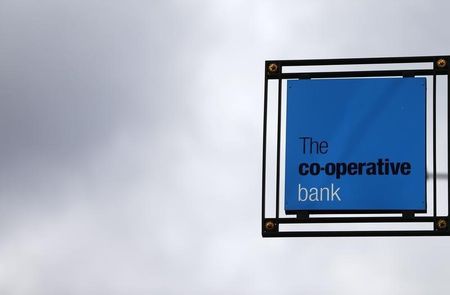By Matt Scuffham
LONDON (Reuters) - The former bosses of Britain's Co-operative Bank are to blame for the lender's near-demise last year, a committee of lawmakers said, in a report which also questioned the role played by regulators and auditors KPMG.
The 123-page report from the UK parliament's Treasury Select Committee examined the Co-op bank's aborted attempt to buy hundreds of branches from Lloyds Banking Group last year. It found that the attempted purchase, which preceded a crisis at the lender, had not been pushed by politicians.
The report pointed instead to failings within the bank itself, including a governance structure which, it said, was until last year "entirely inadequate for a bank of any size".
The Co-op bank fell under the control of bondholders last year when a 1.5 billion pound capital shortfall was identified, shortly after its attempt to buy the 631 branches from Lloyds collapsed.
"Each of the backstops -- Co-op Bank itself, KPMG as its auditor, and the FSA as its regulator - failed to uncover the bank's capital shortfall until it was too late," the committee's chairman Andrew Tyrie, a Conservative lawmaker, said.
"Each had a hand in this sorry tale. But by far the biggest responsibility lies with the Co-op Bank's leadership."
The lender, which has 4.7 million customers, hit trouble after racking up big losses on commercial property, much of which was acquired through its 2009 takeover of the Britannia Building Society.
The Treasury committee recommended that investigations into Co-op Bank's failings by Britain's finance ministry and the Financial Reporting Council (FRC) should focus on the role of Co-op Bank's auditor, KPMG, and Britain's financial regulator.
Tyrie said the FRC's investigation should focus on why toxic assets sitting on the bank's books were not discovered earlier.
"Co-op Bank's huge losses on the Britannia assets remained uncovered for years despite numerous audits by KPMG. The FRC's investigation needs to find out how something so important came to be overlooked," he said.
KPMG said in response that it was co-operating fully with the FRC's investigation.
"As the former auditor to the bank, we believe that we have provided robust audits which challenged the judgements and disclosures proposed by the bank's management," KPMG said.
The FRC said it would take into consideration the points raised in the committee's report.
"INADEQUATE" GOVERNANCE
The committee, which is charged with overseeing Britain's finance ministry, said the biggest responsibility for the bank's problems lay with its leadership.
It said the corporate governance structure was inadequate, with a board dominated by members from its parent, the Co-operative Group, who lacked financial services experience.
The bank suffered embarrassment last year when its former chairman Paul Flowers, a former Methodist minister and local councillor, pleaded guilty to possessing illegal drugs.
Co-op Bank said in response to the report that it had made significant progress towards reform over the past year.
"The bank's board looks very different today and is now managed and governed independently to the group," it said.
The Financial Conduct Authority, which replaced the FSA in April last year as financial regulator and is conducting its own investigation into the problems at the bank, said it would consider the committee's recommendations.
The committee's report found there was no political meddling in the failed sale of Lloyds branches to the Co-op, despite allegations made by the former head of a rival bidder. But it said Britain may have missed out on an opportunity to build its sought-after "challenger" bank.
Lloyds was ordered to sell the branches by European competition regulators as a condition for approving its 20.5 billion-pound government bailout in the financial crisis.
The sale was supposed to create a viable rival for Britain's 'big 4' banks - Lloyds Banking Group, Royal Bank of Scotland, HSBC and Barclays - and Tyrie said the collapse of the deal in April last year had a negative effect on banking competition in Britain.
Lloyds subsequently rebranded the branches as TSB and listed the business. TSB has a 4.2 percent share of the UK personal current account market, compared with the 7 percent which a combination of Co-op and the Lloyds branches would have had.

"There is a risk that a bank of this size might struggle to grow significantly and act as a true challenger in the market," Tyrie said.
(Additional reporting by Huw Jones; Editing by Clara Ferreira Marques)
_800x533_L_1412520412.jpg)